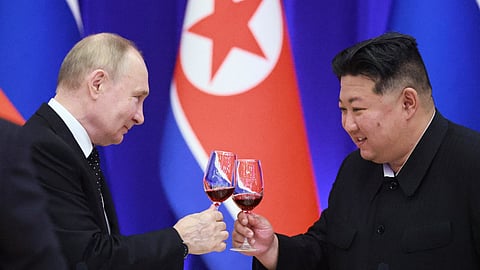
- NEWS
- the EDIT
- COMMENTARY
- BUSINESS
- LIFE
- SHOW
- ACTION
- GLOBAL GOALS
- SNAPS
- DYARYO TIRADA
- MORE

North Korea has sent an estimated 10,000 troops to Russia for training, a figure that triples previous US assessments and has drawn strong warnings from NATO and the EU regarding the war in Ukraine.
This escalation marks a new phase in the conflict, with Pyongyang—already widely suspected of supplying arms to Moscow—now deploying ground forces that could support Russian operations near Ukraine.
Ukrainian President Volodymyr Zelensky cautioned that North Korea’s military presence in Russia could increase to 12,000 soldiers soon, while US President Joe Biden called the move “very dangerous.”
According to Deputy Pentagon Press Secretary Sabrina Singh, “We believe that the DPRK has sent around 10,000 soldiers in total to train in eastern Russia,” adding that these troops will likely reinforce Russian forces in the coming weeks.
Expanding Russian Involvement
NATO Secretary-General Mark Rutte characterized the North Korean deployment as a “dangerous expansion of Russia’s war” and a signal of Putin's reliance on foreign military support. Rutte highlighted Russia’s significant casualties—over 600,000 soldiers killed or wounded since the invasion began in 2022—as a strain on Kremlin resources.
Despite these losses, Russia has made recent advances, capturing 478 square kilometers (184 square miles) of Ukrainian territory since early October, an acceleration compared to previous months.
In response to these developments, European Commission President Ursula von der Leyen warned that North Korea’s troop deployment represents “a significant escalation of the war against Ukraine and threatens global peace.” Following a conversation with South Korean President Yoon Suk Yeol, von der Leyen assured him that the EU will coordinate closely with South Korea and other allies to address this situation.
Strategic Implications and Global Concerns
The North Korean soldiers are reportedly training in Russia’s western Kursk region, where Ukrainian forces have launched recent offensives. Rutte, speaking from Brussels after meeting with South Korean intelligence officials, confirmed the troop presence and warned of the implications for global security.
Experts suggest that North Korea may be seeking access to Russian military technologies, including satellites and submarine capabilities, in exchange for its military support.
The United States has also urged China, an ally of both Moscow and Pyongyang, to consider the destabilizing impact of Russia and North Korea’s actions.
Ukrainian Call for Support
At a press conference in Iceland, Zelensky highlighted the imminent escalation, estimating that North Korea could soon send up to 12,000 soldiers. He urged the international community for more than sanctions, calling for weapons and strategic measures to counter North Korea's involvement in the conflict.
Andriy Yermak, Zelensky’s chief of staff, expressed concerns that North Korea’s involvement could embolden other autocratic regimes to challenge NATO in Europe, emphasizing that “our allies have this strength.”
As NATO Secretary-General Rutte demanded an immediate cessation of actions from both Moscow and Pyongyang, the global community awaits further developments, with growing concerns over the broader implications for the Indo-Pacific and Euro-Atlantic regions.
